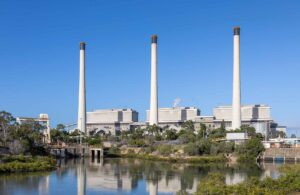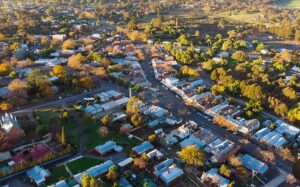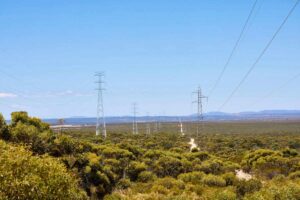The two members of the Climate Change Authority who last week broke ranks with the rest of the advisory body over the inadequacy of its climate policy recommendations, and this week released their own version of the report, say claims ambitious climate action is not economically possible are “manifestly absurd.”
The pair, ethics professor Clive Hamilton and eminent climate scientist David Karoly, said in an op-ed on Monday that the basis for their decision not to sign off on last week’s CCA report was its failure to factor in the constraint of Australia’s ever-tightening carbon budget.

“This is all the more regrettable because the requirement to do so is embedded in the Special Review’s terms of reference and was analysed in the First Report of the Special Review released in April 2015 (before the appointment of six new Members to the Authority in October 2015),” they wrote.
But in comments on ABC Radio on Monday morning, Hamilton also suggested that the CCA – set up as an independent statutory authority – had shaped its report to suit Australia’s current political environment, rather than basing it on the best available scientific and economic evidence.
“When the CCA was established it was made very clear in the legislation that it is independent,” he said. “We don’t believe that it’s the role of the authority to thread a political needle, to try to create something, craft a report that will suit the particularities of the cross-bench of the current parliament.
“Our report is based very firmly on the science,” he added. “Moreover, it is based directly on the recommendations of the climate change authority itself in the very first report of this review, which came out a year ago, a year before there was a change-over in the membership of the CCA.
“The Authority recommended to the government that Australia should reduce its emissions by 45-65 per cent by 2030, and it was in response to that that the Abbott government came up with these targets of 26-38 per cent,” he said.
The act of dissent caps off an altogether unconvincing first week back of parliament for Malcolm Turnbull’s Coalition, and puts newly minted energy and environment minister Josh Frydenberg on the spot to explain both the divide within the revamped CCA board and the cloud over the government’s climate policies.
But in comments to ABC Radio, directly preceding Hamilton’s, Frydenberg appeared happy to pick up where Greg Hunt left off, reading from the Abbott government climate songbook: a 26-28 per cent emissions reduction target is world-leading and ambitious; 2030 is a long way away; we’re pulling out weight.
Hamilton’s response: Australia “manifestly is not doing enough,” and is rapidly running out of time to correct the situation.
And he had a message for Frydenberg: “The minister’s new to the job, so let me be charitable; but I worried a lot when I heard him say that 2030 is a very long way away. Minister, 2030, if you’re trying to transform the energy economy of Australia and reduce our emissions, it’s actually very close.
“It takes a very long time… And if we’re going to adhere to our international commitment … then we have to take much stronger actions by 2030 than the government is currently committed to.
“(The Abbot government targets) are some of the weakest in the world. And the truth is that setting that kind of target is completely inconsistent with the goal of the Australian government which it signed up to again at Paris of limiting global warming to 2°C,” he said.
Hamilton said the government’s first order of climate policy business should be to “set a proper target,” and then to address the question of how best to get there.
“The best way to get there is to use effective economic instruments – and not the format of the Direct Action policy, particularly the Emissions Reduction Fund, which pays polluters to reduce emissions and has all sorts of problems.
“We think that the first target should be to close down the dirtiest coal fired power plants in short order over the next several years.
“The truth is… the industry is expecting this. There’s kind of several big coal-fired power plants like Hazelwood that are on the brink of closure …To take those out of the electricity industry over the next few years would make a huge difference to Australia’s efforts.”
Finally, Hamilton also said that claims by lobby groups such as the Minerals Council that ambitious climate action would drive Australia’s economy into the ground as “a manifest absurdity” and a “$100 turkey kind of claim.”
“If you look at the various reports, including the one which accompanies the majority report of the CCA, it shows that very significant emissions cuts, like the ones we’re advocating, would have a very modest economic impact,” he said.
“In fact, in the longer run we have to make a decision on whether we want to have an economy that consists of old clunkers or whether we want to be a part of the energy economy of the future.”
The response from the broader science community, meanwhile, has been one of support for the dissenters and condemnation of the Coalition and the major CCA report.
“The dissenting report is a damning critique – slamming the official report’s failure to recommend strengthening our current emissions target, or the Renewable Energy Target,” said the Climate Council’s Will Steffen – the Climate Council published the Hamilton-Karoly report on its website.
“It’s not the first time there’s been dissent in the ranks either,” he added. “Many of the original Climate Change Authority members resigned after they weren’t being listened to, and were replaced by members who were strong on political connections but short on scientific expertise and understanding.
“Sadly, it’s clear that we can’t rely on the government to provide independent scientific information. We experienced that first hand when the Climate Commission was abolished by the Abbott Government,” Steffen said.
“The (2016) CCA report is contradictory with the Authority’s 2014 report and with Australia’s role in keeping global warming below 2℃,” said Sophie Lewis, an ARC DECRA Fellow at the Fenner School of Environment and Society and the ARC Centre of Excellence for Climate System Science at The Australian National University.
“By accepting the current government’s targets for greenhouse gas emission cuts, it creates a crunch point for emissions reduction in 2030 that we can’t possibly achieve,” Dr Lewis said.
“Professors Karoly and Hamilton should be applauded for their courageous stance,” said Peter Tangney, a lecturer in science policy and communication at Flinders University. “Their minority report highlights the discrepancy between the CC Authority’s plan and what is required to ensure Australia cuts emissions as quickly as possible.”
“The dissenting report… illustrates just how wide the difference is in informed views on the issue of climate change policy,” said associate professor Frank Jotzo, Director of the Centre for Climate Economics and Policy at the Australian National University.
“It also begs the question of what the role of independent statutory bodies should be in this debate. Should the CCA give advice that is calibrated to political circumstance, or advice that is predominantly guided by science and economic fundamentals?
“The CCA’s intent (in this case) clearly is to help policy progress in the medium term. But it risks locking-in a policy suite that will be costly or less effective. And if the CCA’s recommendations are misconstrued as being ambitious, we could end up with policy that falls far short of these recommendations.”
Greens MP Adam Bandt applauded Hamilton and Karoly for “blowing the whistle,” and urging “frank and fearless advice” about the level of action needed to combat climate change.
“If the Reserve Bank stopped adjusting interest rates because it might upset the government, there would be an outcry,” he said. “The Climate Change Authority had been telling us to live within our means and had urged strong climate action until the Liberals replaced the Chair and stacked the board.
“These two whistleblowers are telling the country that to meet the Authority’s own recommendations and have the best chance of avoiding catastrophic global warming we need to get our skates on.”
“The Prime Minister and his Energy and Environment Minister need to listen to these courageous whistleblowers and put in place climate and energy policies that will drive down pollution rapidly.
“The number one action the government must take is to start the phase out of the oldest and dirtiest coal fired power stations, such as Hazelwood in Victoria, a recommendation of both the Authority’s majority and minority reports,” Bandt said.








